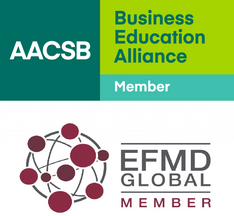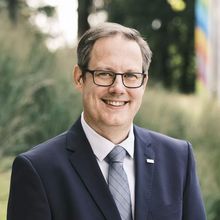Fast Trader or Fair Trader? Regional or International? The answer is AND. New times call for new strategies and new answers to questions arising from digitalization and internationalization.
In pursuing our vision, JKU Business School is guided by four value pairs. JKU Business School encourages its immediate stakeholder groups, such as students, alumni and partner organizations, to follow these values as well. In following and promoting these values, a unique JKU Business School mindset is created that guides the School and its partners.
Bold and Entrepreneurial.
Firmly anchored in the region, JKU Business School is an academic hub with an international focus. We not only teach our students to be responsibly and entrepreneurially minded, we also prepare them to face key challenges of our times: Digital transformation and sustainability.
Curiosity-driven and Research-led
Each of the JKU Business School’s three divisions (Finance & Accounting, Management & Marketing, and Supply Chain & Information Management) include high-profile researchers working at the forefront of their respective subject areas as a driving force behind a new-knowledge generation. When it comes to successful knowledge transfer, our faculty members’ insight and expertise serves as a solid foundation, both in the classroom and when it comes to real-world business practices.
Connected and Impactful
Our broad-based academic degree programs provide students with insight as to how different topics interlink, resulting in a stronger understanding of companies on a whole. Our graduates possess highly valued skills and the ability to think outside of the box, and quickly become socially responsible managers and leaders of the future.
Supportive and Collegial
Our students benefit from the Business School's supportive, work-friendly and diversity-rich environment. Be it a small study group or individual interaction, students enjoy both formal and informal opportunities to interact with attentive, high-profile scholars and researchers.

JKU Business School
Address
Johannes Kepler University Linz
Altenberger Strasse 69
4040 Linz
Location
Management Center
2nd Floor, Room 210 B
We're here for you
Monday-Thursday:
9:00 AM - 12:00 PM
Contact Us
Send us an E-Mail
Want to know more about the JKU Business School? Check out this video! When viewing the video, you can choose German or English subtitles.

This Event is held in German.
Please switch to the German page.
Prof. Dr. Susanne Strahringer will give a lecture on the topic "Digitalisation without IT specialists and managers? - Business informatics' contributions to solving a dilemma".
![[Translate to Englisch:] 4. Heinrich Vorlesung](/fileadmin/_processed_/5/2/csm_HeinrichVO_24_1626e6a9ab.png)
Find out about the Master's degrees the Business School has on offer!

On April 19, 2024, students of the Economic and Business Analytics (EBA) program had the opportunity to participate in an informative excursion to Engel in St. Valentin. The highlight of the excursion was an inspiring keynote presentation on the topics of sustainability and circular economy, delivered by experts from Engel. Additionally, the presentation also explained how modern data analysis is used in the company.
The keynote presentation provided students with valuable insights into Engel's efforts to promote sustainable business practices and implement the principles of the circular economy. Furthermore, they gained an overview of how data analysis and algorithmic solutions can contribute to optimizing operational processes and minimizing resource consumption. Following the presentation, students were invited to a fascinating tour of Engel's production hall. During this tour, they were able to experience firsthand how state-of-the-art production processes are implemented to produce innovative products.
The tour of the production hall not only provided students with a unique insight into the technology and innovation at Engel but, also imparted an inspiring lesson on the importance of efficiency, sustainability, and responsibility in modern industry. Overall, the excursion to Engel in St. Valentin was an extremely educational experience for the students, providing them with valuable insights into practical applications in a leading company in the industry.
